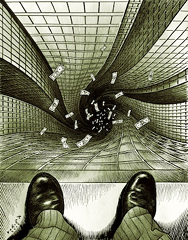“The two-year-old U.S. housing recovery is faltering.
The Mortgage Bankers Association lowered its new and existing home sales forecast for 2014 to 5.28 million — a decrease of 4.1 percent that would be the first annual drop in four years. The industry group also cut its prediction on mortgage lending volume for purchases to $751 billion, an 8.7 percent decline and the first retreat in three years.
Bullish forecasts in early 2014 from MBA, Fannie Mae and Freddie Mac have been sideswiped by rising home prices and an economy that isn’t producing higher paying jobs.
The share of Americans who said they planned to buy a home in the next six months plunged to 4.9 percent last month from 7.4 percent at the end of 2013, the highest in records going back to 1964, according to the Conference Board, a research firm in New York.
“The big housing rally wiped itself out because prices increased too quickly for buyers to keep up,” said Richard Hastings, a consumer strategist at Global Hunter Securities LLC in Charlotte, North Carolina, who predicted the slowdown eight months ago. “The pool of eligible new buyers is collapsing” because of stagnant incomes and lack of credit, he said.
The best-qualified homebuyers jumped into the market last year to grab near-record low mortgage rates that averaged about 3.5 percent after delaying their moving plans during the housing slump, said Nariman Behravesh, chief economist of IHS Inc., a research firm based in Englewood, Colorado.
Stagnant Wages
The median price of an existing home gained 11.5 percent last year, second only to 2005’s 12 percent increase, the highest on record, according to the National Association of Realtors. This year, price appreciation probably will slow to 5.6 percent, NAR said.
As prices climb, the ability of Americans with stagnant wages to buy homes wanes.
The median U.S. household income rose less than 1 percent in 2013, according to data from Sentier Research LLC in Annapolis, Maryland. In April, the median income was $52,959. When adjusted for inflation, that’s almost 6 percent lower than in June 2009, which marked the beginning of the economic recovery, said Gordon Green, a Sentier partner who formerly directed the Census Bureau office that compiles wage statistics.
“Even though we’re technically in a recovery, household income is lower now than it was in the recession,” Green said. “It makes it a lot harder to buy a house.”
Changing Forecasts
Three major housing forecasters — MBA and government-run mortgage financiers Freddie Mac and Fannie Mae — began the year projecting an average home-sale gain of 10 percent in 2014.
In May, after monthly reductions in their estimates, Fannie Mae and MBA for the first time projected an annual decline, amounting to less than one percent.
Freddie Mac this week lowered its home sales 2014 forecast 1.8 percent to 5.4 million — which would be the first annual drop in four years. The company also cut its prediction on mortgage lending volume for purchases 1 percent to $751 billion, the first annual reduction in three years.
While home purchase applications have picked up recently…..”
Comments »






